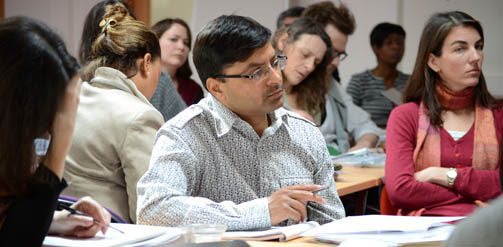APPLICATIONS ARE NOW CLOSED
This five day course tackles an emerging problem in development evaluation: how to ensure that we have the right mix of methods to provide relevant and credible impact evidence. In order to do this, we need to achieve a better understanding of the potential contribution of various evaluation designs and methods, and create the space for thinking this through and incorporating it into our practice.

Course Overview
The course will focus on the use of a wide range of methodologies to meet the growing demands for evidence of impact, particularly as the global community seeks to achieve the Sustainable Development Goals. The course provides the necessary framing to make better informed design choices, while not being exhaustive on any one particular methodology.
The course covers an overview of the different demands for impact evidence in communities, civil society organisations, the private sector, governments and (international) organisations. These demands range from identifying what works “here and now” (such as on how, under what circumstances and for whom), to providing evidence on what will work “there and then” (i.e., what will become sustainable over time and in many locations and for many, under many circumstances).
A theory of change approach is introduced to help analyse the actions, assumptions and risks that constitute the causal pathways from the intervention to higher level and ultimate goals. This analysis will provide the necessary insights to ensure the choice of key questions and a good mixture of methodology and analytical tools.
Different causal mechanisms and theories will be introduced, from counterfactual causality to production causality and systems causality. Promising new impact approaches like realist evaluation and specific methodology such as Qualitative Comparative Analysis, Delphi methodology, Social Network analysis and Process Tracing will be discussed, not to master these tools in detail, but to understand the role they could play in a “mixed methods” evaluation.
After the interactive introductory sessions a few case studies will be presented and studied, related to the experience of the participants. Students will use these case studies to work on their own “mixed method” evaluation approach paper – identifying demand for impact evidence, formulating the theory of change of the intervention, choosing an appropriate methodological approach and presenting this to the other course participants.
Learning Outcomes
At the end of the course participants will be able to:
- Understand current debates on impact evaluation methodologies and evidence-based policies
- Develop a “mixed methods” evaluation of impact, including appropriate causal perspective
- Choose the optimum mix of tools and techniques to gather and analyse data for impact evidence
- Judge the quality of evaluation approaches for impact evidence prepared by other evaluators.
Course Tutors
The course is led by CDI and Itad Director Dr. Chris Barnett and Prof. Rob D. van den Berg, Visiting Fellow at CDI and Visiting Professor at King’s College London. Together they have over 40 years of experience in evaluation and development.
Internationally recognised researchers from IDS, Itad and the University of East Anglia will also contribute to the course. To date, Prof. Robert Chambers, Dr. Inka Barnett and Dr. Dolf te Lintelo are confirmed as guest lecturers.
Course Fee
The course fee is £1,500 (GBP). The fee includes the tuition fees, course materials, lunches, refreshments and one group dinner. It does not cover accommodation or travel costs.
Please contact the Course Coordinator, Deborah West if you have any queries.
Accredited by the British Accreditation Council for Independent Further and Higher Education as a Short Course Provider.
Application Process
All applicants should read the Designing Effective Ways to Evaluate Impact Short Course 2017 Terms and Conditions before completing the application form below.
The application procedure is a 3-stage process:
Stage 1: Deadline for applications is 7th October 2016. Applications can only be made by completing the online application form.
Stage 2: Applicants will receive the outcome of the review process by the 17th October 2016. Successful applicants will receive the Stage 2 form and an invoice for the course fee which needs to be paid by the 17th November 2016. Places on the course are not guaranteed until fees have been received.
Stage 3: Once fees have been received, applicants will receive confirmation of a place on the course and a letter to support their visa application (if required). Please note: Course leaders and teachers may change at short notice.